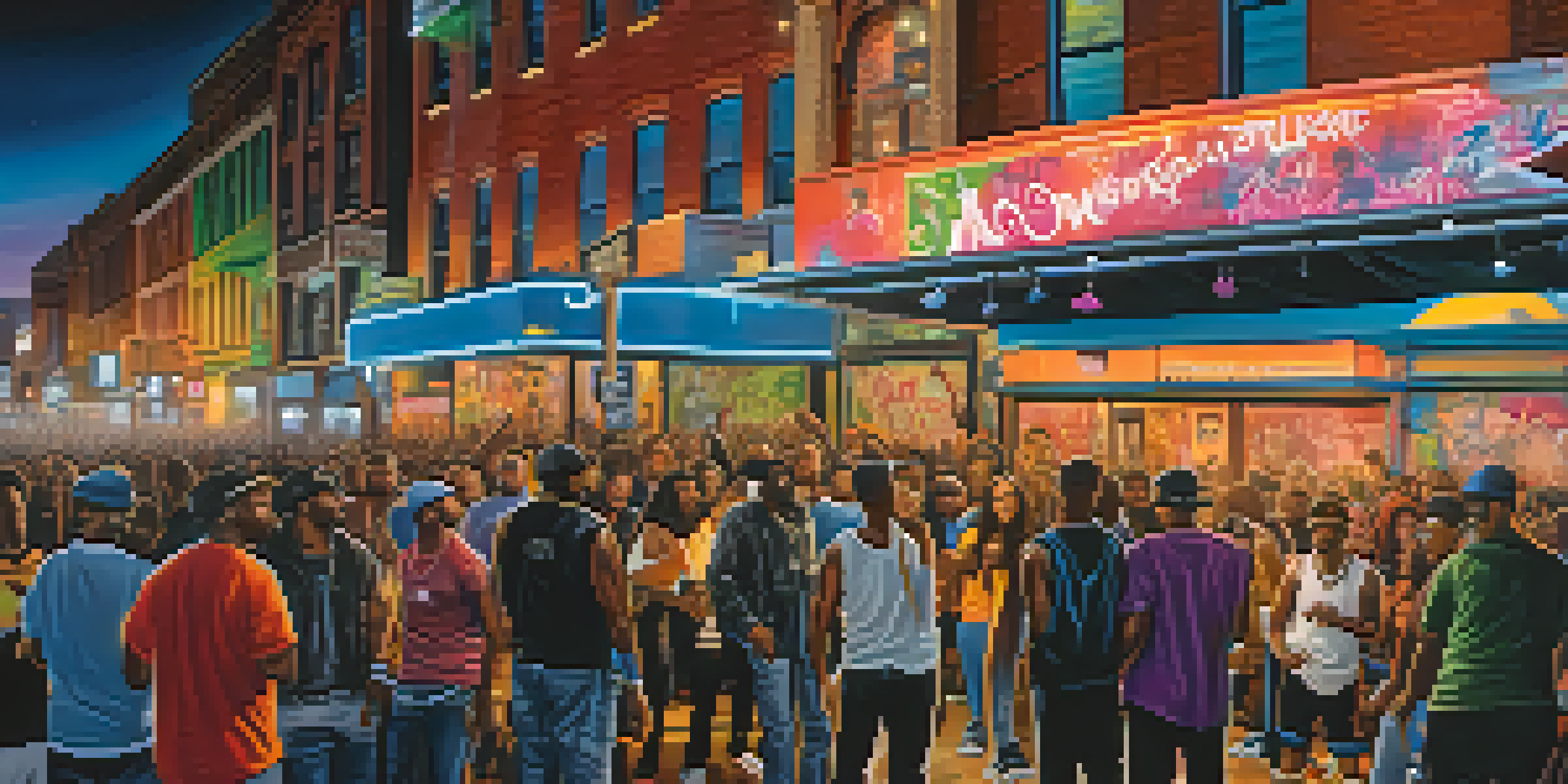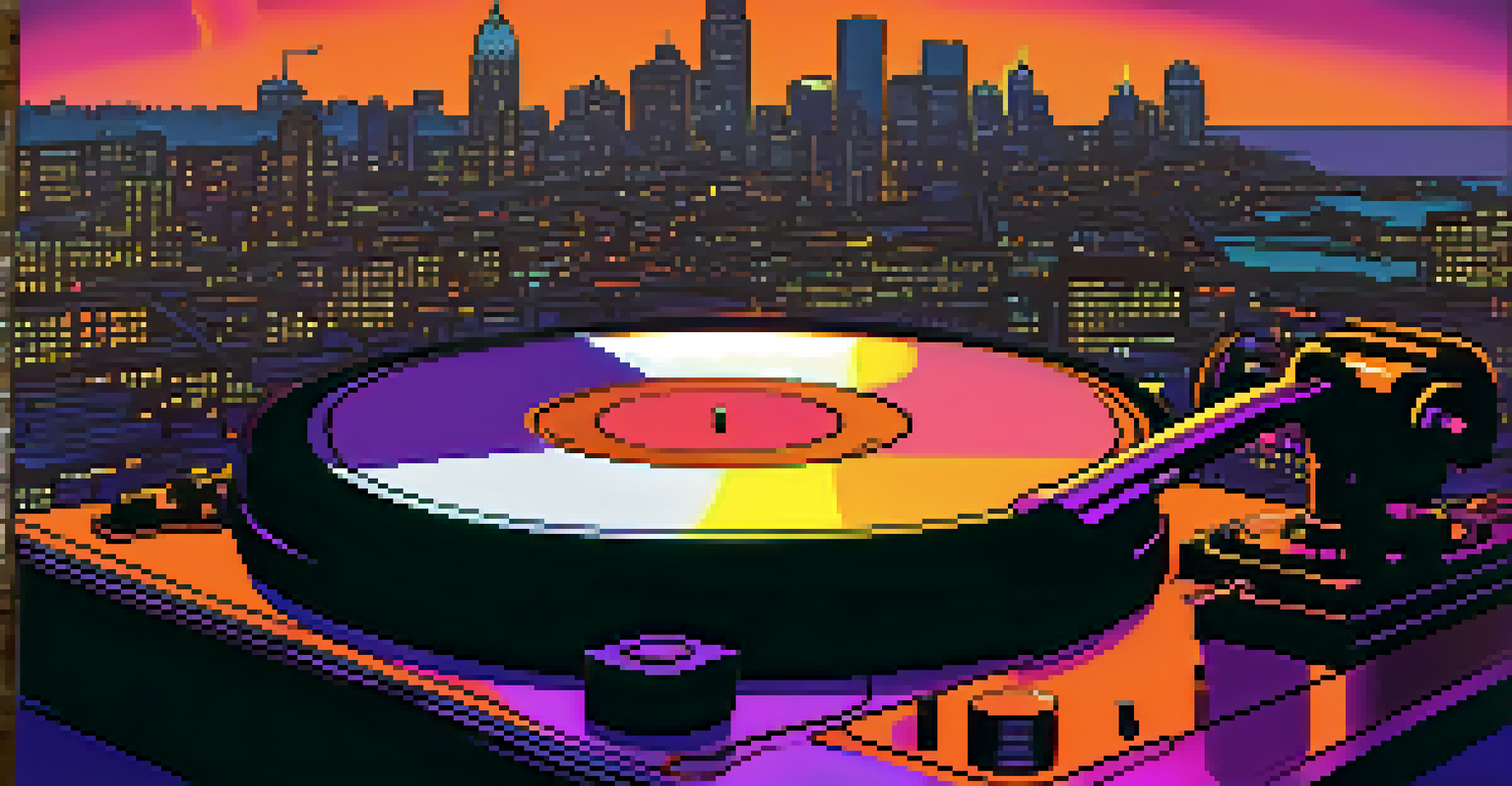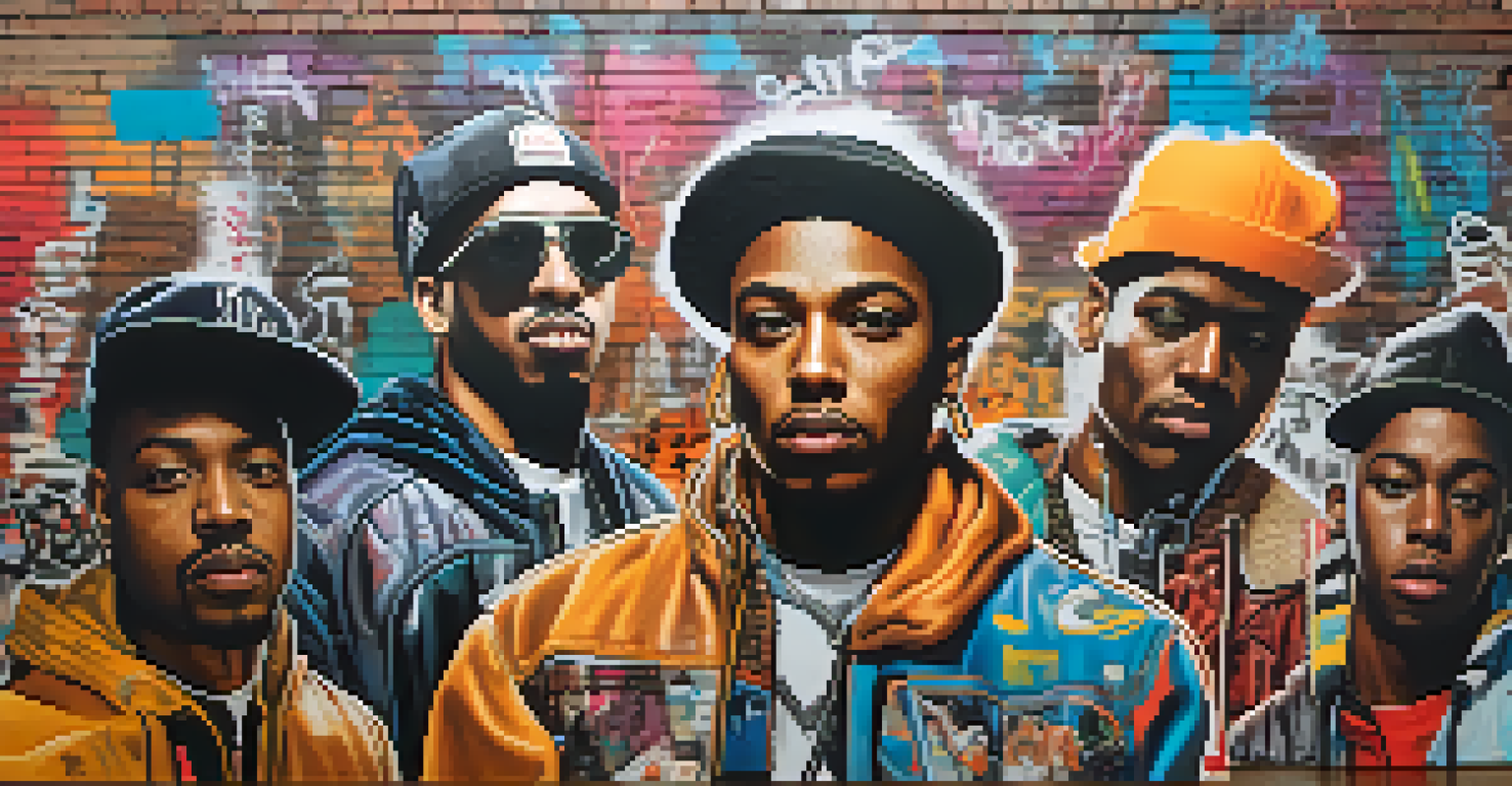The Evolution of Detroit Hip-Hop: From Underground to Mainstream

The Roots of Detroit Hip-Hop: A Cultural Melting Pot
Detroit's hip-hop scene emerged in the late 1980s, steeped in a rich cultural backdrop. The city's history of Motown music, punk rock, and techno laid the groundwork for a unique sound that blended various influences. Artists like J Dilla and Slum Village began to shape the narrative, drawing from the struggles and resilience of their environment. This fusion created a distinctive style that resonated with both local and national audiences.
Hip-hop is a voice for the voiceless, a way to express what many people feel but can't articulate.
The early days were characterized by underground battles and local shows, where emcees showcased their skills in small venues. These grassroots efforts fostered a tight-knit community that valued authenticity and creativity over commercial success. It was in these intimate settings that the seeds of Detroit hip-hop were sown, laying the groundwork for future stars. The local scene thrived on collaboration, with artists often coming together to support one another.
As the sound evolved, it began to attract the attention of industry professionals who were intrigued by its originality. This interest marked the start of a journey that would take Detroit hip-hop from the shadows into the spotlight. The city's unique narrative, shaped by its cultural diversity and economic challenges, became a source of inspiration for many artists, setting the stage for a new era.
The Rise of Independent Labels and Artists
In the 1990s, independent labels began to emerge, giving Detroit artists a platform to share their music without the constraints of major labels. Labels like Stones Throw and Fat Beats played a crucial role in promoting local talent, allowing artists to maintain their creative control. This independence fostered a DIY ethos that became synonymous with Detroit's hip-hop identity, encouraging artists to define their sound on their own terms.

One of the standout figures from this era is Eminem, whose rise to fame in the late 90s showcased the potential of Detroit hip-hop on a global scale. His raw lyrics and unique storytelling captured the struggles of life in the city, resonating with fans worldwide. Eminem's success opened doors for other artists, leading to a surge in interest in Detroit's music scene. Suddenly, the world was paying attention to the unique voices emerging from the Motor City.
Detroit's Unique Hip-Hop Roots
Detroit hip-hop emerged from a rich cultural background, blending influences from Motown, punk, and techno to create a distinctive sound.
This period also saw the emergence of collectives like D12, which highlighted the collaborative spirit of the Detroit hip-hop scene. These groups not only produced chart-topping hits but also emphasized the importance of community and collaboration. The independent label movement helped solidify Detroit's place in the hip-hop landscape, proving that authenticity could thrive alongside commercial success.
The Influence of Technology and the Internet
As the internet began to take off in the early 2000s, it transformed the way artists approached music distribution and promotion. Detroit hip-hop artists leveraged platforms like MySpace and later SoundCloud to share their work with a broader audience. This shift allowed for unprecedented access to music, enabling emerging artists to build their fanbase without relying on traditional media channels.
The beauty of hip-hop is that it empowers people to tell their stories in their own way.
Social media also played a pivotal role in connecting artists with fans, creating a sense of community that transcended geographical boundaries. Artists could share their stories, struggles, and successes in real time, fostering a deeper connection with their audience. This newfound accessibility helped to democratize the music industry, making it easier for Detroit’s diverse voices to be heard.
However, this digital revolution also brought challenges, as the oversaturation of content made it difficult for individual artists to stand out. Despite this, many Detroit hip-hop musicians found innovative ways to market themselves, utilizing viral trends and online collaborations. The internet became a powerful tool for artists to navigate the ever-changing landscape of the music industry while staying true to their roots.
Mainstream Breakthrough: From Local to Global
By the 2010s, Detroit hip-hop began to break into the mainstream, thanks in part to artists like Big Sean and Danny Brown. Their unique sounds, combined with their authentic storytelling, resonated with audiences beyond the city limits. Big Sean's collaborations with major artists and hits like 'I Don't F**k with You' showcased Detroit's lyrical prowess and creativity on a national stage.
This mainstream success paved the way for a new generation of artists, such as Tee Grizzley and Sada Baby, who continued to push the boundaries of Detroit hip-hop. Their music often reflects the realities of life in the city, addressing themes of struggle, success, and resilience. As these artists gained popularity, they carried the torch for the next wave of talent emerging from Detroit's vibrant scene.
Growth of Independent Artists
The rise of independent labels in the 1990s allowed Detroit artists to maintain creative control and fostered a DIY ethos in the music scene.
Moreover, the rise of platforms like TikTok has further amplified Detroit's presence in the music industry. Viral challenges and trends have propelled local artists to new heights, allowing them to reach audiences that were previously out of reach. This visibility not only benefits the artists but also highlights the rich cultural heritage of Detroit, showcasing its evolution from underground to mainstream.
Cultural Impact: Detroit Hip-Hop's Legacy
The cultural impact of Detroit hip-hop extends far beyond music; it has influenced fashion, art, and social movements. Artists have used their platforms to address social issues, shining a light on the challenges faced by their communities. This activism has inspired a new generation of artists to use their voices for change, demonstrating the power of hip-hop as a tool for social commentary.
Additionally, the gritty aesthetic of Detroit's hip-hop scene has permeated various aspects of popular culture, inspiring fashion trends and visual art. The city’s unique style, characterized by bold colors and urban influences, reflects the resilience of its people. From murals celebrating local legends to fashion lines inspired by hip-hop culture, the influence of Detroit's artists is evident everywhere.
As Detroit hip-hop continues to evolve, its legacy remains firmly rooted in the city’s identity. The artists that have emerged from Detroit are not only musicians but also cultural ambassadors, showcasing the rich tapestry of experiences that define the city. Their stories, struggles, and successes contribute to a broader narrative, ensuring that the spirit of Detroit hip-hop endures for generations to come.
Challenges and Triumphs: The Detroit Story
Despite the success, Detroit hip-hop has faced its share of challenges, including economic struggles and a lack of resources. Many artists have had to navigate a difficult landscape, often relying on their own ingenuity to create and promote their music. This resilience is a testament to the spirit of Detroit itself, where communities come together to support one another in the face of adversity.
These challenges have often fueled the creativity of local artists, inspiring them to tell their stories in innovative ways. Many have drawn from their own experiences, turning pain into art and creating music that resonates deeply with listeners. This authenticity has become a hallmark of Detroit hip-hop, setting it apart from other scenes across the country.
Future of Detroit Hip-Hop
With a new generation of talent experimenting across genres, the future of Detroit hip-hop looks promising and innovative.
Ultimately, the triumphs of Detroit hip-hop serve as a reminder of the power of perseverance and community. The artists who have emerged from this scene continue to inspire others, showing that success is attainable even in the face of obstacles. As Detroit hip-hop moves forward, it remains a powerful force for change and creativity, reflecting the strength of its roots.
The Future: What's Next for Detroit Hip-Hop?
Looking ahead, the future of Detroit hip-hop appears bright, with a new wave of talent ready to take center stage. Artists are experimenting with various genres, blending hip-hop with elements of rock, jazz, and electronic music. This willingness to innovate ensures that Detroit's sound remains fresh and relevant, capturing the attention of listeners both locally and nationally.
Moreover, the ongoing support from the community and local organizations plays a crucial role in nurturing emerging talent. Initiatives aimed at providing resources, mentorship, and performance opportunities help to cultivate the next generation of artists. This commitment to fostering creativity is essential for the continued growth of the Detroit hip-hop scene.

As the landscape of music continues to evolve, Detroit hip-hop is poised to remain a key player. With its rich history, diverse influences, and unwavering spirit, the city will undoubtedly produce more groundbreaking artists who will shape the future of the genre. The journey from underground to mainstream is far from over, and the world will continue to watch as Detroit's hip-hop story unfolds.